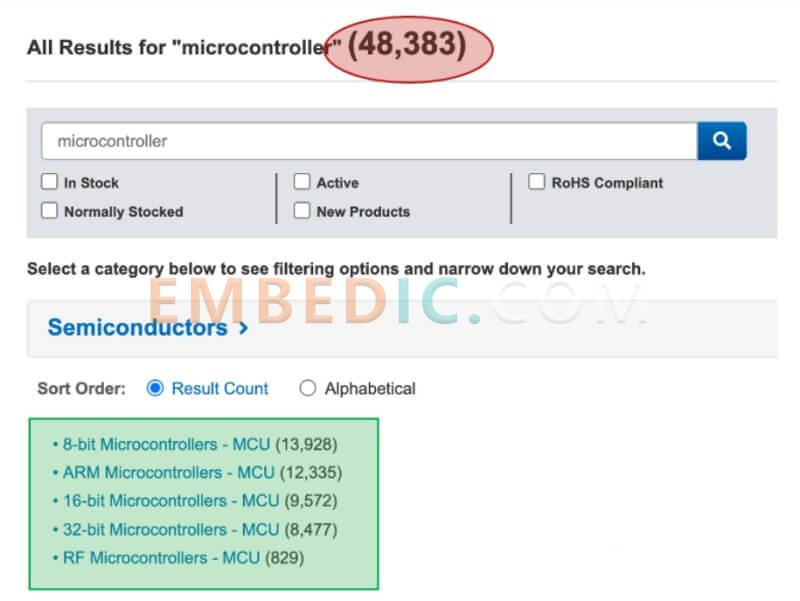Recently, STMicroelectronics (ST) officially launched the 32-bit STM32C0 MCU and clearly stated that it will be used to "replace" 8-bit MCUs. After ST launched STM32C0, Renesas also followed with the 16-bit MCU RL78/G15, also targeting the 8-bit MCU application market, in order to achieve replacement.
Industry majors seem to be taking action to prove that 8-bit MCUs are on the decline. More than a decade ago, industry experts claimed that 8-bit MCUs were dead; in 2012, when Freescale launched the Kinetis L series, it also made the claim that it would be the "end of 8-bit MCUs", threatening to eat up the 16-bit MCU market before squeezing out the 8-bit MCU share.
However, ten years later, the reality does not seem to have evolved according to the above prediction.
Despite the competition from low-cost, low-power 32-bit MCUs, 8-bit MCUs still occupy a place in the competitive market. It can be seen from the official website of the industry distributor Tradezer Electronics. There are approximately 50,000 different MCUs available worldwide. Among them, the largest number of 8-bit MCUs are available, accounting for the largest percentage.

From the perspective of MCU development and the current situation, the view that 8-bit MCUs are dying out is clearly exaggerated.
MCU refers to Microcontroller Unit (MCU), also known as a single-chip microcontroller, is the central processing unit (CPU) frequency and specifications to do appropriate reduction, and the memory, counter, USB, A/D conversion, UART, and DMA and other peripheral interfaces, and even LCD driver circuit are integrated in a single chip. It is suitable for control processing of specific applications and an indispensable component of various control circuits.
With the development of smart home, electric vehicle, IoT and other application markets, MCU chips have been widely used in various fields. According to IC Insights statistics, MCU sales exceed 29 billion units in 2021, reaching a market size of $18.5 billion. And it is expected that from 2021 to 2026, the total MCU sales are expected to grow at a CAGR of 6.7%, and the market size will reach $27.2 billion in 2026, which is a vast market space.

MCU market size and ASP trends and forecasts (Source: IC Insights)
Based on the width of the bus or data transient, MCUs can be classified as 4-bit, 8-bit, 16-bit, 32-bit, and 64-bit microprocessors with increasing data processing power and application scenarios becoming more complex. Currently, although the market prefers 32-bit MCUs, 8-bit MCUs still occupy a huge market. Many small home appliances and electronic products in the market still use 8-bit MCU chips, and 8-bit MCU application areas are mainly focused on electric toys, keyboards and USB devices.
Looking back at the history of MCU industry, 8-bit MCU was first introduced in 1976, and then soon entered the golden age and became a widely used device in the electronics industry. However, as technology progressed and the electronics industry grew, more and more new designs were introduced and 8-bit MCUs began to gradually fail to meet people's needs.
After that, the emergence of 16-bit and 32-bit MCUs brought a greater threat to 8-bit MCUs, and many manufacturers began to abandon 8-bit MCUs and turn to the research of ultra-low-power 32-bit MCUs. In the 1990s, with the booming development of consumer electronics, 32-bit MCUs emerged to quickly replace the high-end position of 16-bit MCUs, and entered the mainstream market and developed to the present.
At the same time, the performance of traditional 8-bit MCUs has also improved by leaps and bounds, with processing power increasing by hundreds of times compared to the 1970s. Only 16-bit MCUs, in the face of 8-bit and 32-bit MCU "two-way attack", regardless of specifications, features and advantages are squeezed, market share gradually unpopular.
In terms of current mainstream applications, 4-bit and 16-bit MCUs have almost disappeared, with 8-bit and 32-bit MCUs basically sharing the entire application market. 64-bit MCU market is still in its infancy, with most applications in high-end workstations, and advanced terminals. Looking back many years ago, 32-bit MCUs started to gain market attention due to price decreases coupled with performance improvements. The combination of these excellent performance and lower power consumption made 32-bit MCUs an irresistible attraction.
Further Reading: The Difference Between 8-bit, 16-bit and 32-bit Microcontrollers
As the cost of technology decreases, more and more systems will take advantage of technologies to create faster, more capable and easier-to-use products.
Formerly all-analog applications, for example, are gradually moving to "smart" systems, a trend that is driving increasing demand for a variety of MCUs. In recent times, we have seen a number of competing companies producing 32-bit MCU devices eliminate products with smaller memories and fewer pins from their portfolios, which will lead to increased demand for 8-bit MCUs in this area," said the senior manager of medical products in Microchip's MCU business.
In addition, our MCUs are often found in many systems along with 32-bit MCUs. In some areas, 8-bit MCUs are better suited for existing tasks.
Microchip has also repeatedly highlighted the company's continued innovation in 8-bit MCUs.
For example, Microchip has been reinvigorating 8-bit MCUs by adding intelligent peripherals that can both lighten the load on the main processor and use energy-efficient sleep modes while still keeping tabs on their systems for fast and reliable responses to events. This is being done because they see the market continuing to grow, especially with the popularity of core-independent peripherals and smart analog, which is also driving this growth trend.
In fact, back in 2019, STMicroelectronics, which has earned a reputation in the MCU market with its STM32 products, launched the company's STM8 product strategy.
Patrice Hamard, product marketing manager for microcontrollers at STMicroelectronics, explains three reasons why many engineers now still prefer 8-bit MCUs:
(1) Many engineers have been accustomed to using 8-bit MCUs for development, so 8-bit is naturally preferred when choosing;
(2) For cost considerations, electronic products, especially consumer electronics is very price sensitive, even now the 32-bit MCU has been very cheap, but the 8-bit MCU still has a price advantage;
(3) For many simple applications, 8-bit MCU is sufficient, there is no need to choose 32-bit, the right product is the best choice. Therefore, ST still attaches great importance to the 8-bit MCU market.
In addition, 8-bit MCUs are characterized by their simple architecture.
In contrast, 32-bit MCUs, which have better processing performance, are also burdened with the original sin of complex architecture.
In many embedded designs, 8-bit MCUs have the advantage of being easier to design than 32-bit, and the software and hardware following the 8-bit architecture will be easier than 32-bit.
In addition to traditional single-chip systems, 8-bit MCUs are playing an increasing role in system management ICs and co-processors.
This is driven in large part by the dramatic growth of distributed intelligence in applications such as IoT edge devices, automotive safety, industrial control systems, medical electronics, and home electronics. Even the most advanced 5G systems can often benefit from shifting certain tasks to smaller 8-bit MCUs, freeing up higher-level processors to do what they do best.
In terms of current applications, much of the growth in 8-bit MCU processors is being driven by 32-bit processors, which pass on functions such as human-machine interface (HMI) functionality to 8-bit processors. In addition, 8-bit MCUs are increasingly being used as co-processors to perform tasks such as reading sensor readings and pre-processing sensor data before passing it on to higher-level processors.
Something else suggests that 8-bit MCU designs are in growth mode rather than decline mode. That is that 8-bit MCUs have a place in the IoT market. As you can see, 8-bit MCUs are far from obsolete. Not only is the size of the 8-bit MCU pie growing, but a variety of new applications have emerged in the face of new technologies, opening up new niches where they can thrive in the face of competition.
Many large semiconductor manufacturers continue to support the production of 8-bit MCUs, including Microchip, NXP, Renesas Electronics, STMicroelectronics, Silicon Labs, and many domestic MCU industry players that can provide the market with a large selection of 8-bit MCUs. In terms of MCU market share in 2020, 32-bit MCUs account for 55% and 8-bit MCUs still have a 43% market share, which shows that 32/8-bit MCUs are not a single choice, but depend on the application scenario.
You may like: Latest Views on 8-bit MCU Market Development 2022
For 20 years, people have been talking about the imminent elimination of 8-bit MCUs, but this has not become a reality. And we believe that 8-bit MCUs will not exit the stage of history in the future.
All things considered, the success of 8-bit MCUs or the reason why they have not died out has little to do with the fact that they are 8-bit. The reason is that not all applications have graphic displays or need to transfer large amounts of data, and new 8-bit applications are being designed every day that have never before used electronic intelligence.
In some applications, 8-bit still has its place to play, and even in the future for a long time to remain so. On the other hand, for many engineers, it's most often because of familiarity. That's why many white goods manufacturers use 8-bit MCUs in the manufacture of refrigerators, freezers, washers, dryers and dishwashers; automakers use it to develop lift windows, door locks, mirrors, power seats and interior lighting; and tens of millions of smart cards have to integrate it, while countless low-end motors are controlled by 8-bit MCUs.
This has to do with heritage," said Jim McGregor, founder and principal analyst at Tirias Research, "Engineers have been using 8-bit MCUs for so long that they don't want to change their software base.
The biggest reason 8-bit MCUs have endured in the market is because they are irreplaceable in certain applications. In the long run, 32-bit MCUs continue to expand their share of the market, while 8-bit MCUs continue to reform with new applications. It is expected that in the next few years, there will be an era of 8-bit and 32-bit MCUs co-existing in different application markets.
Manufacturer: Texas Instruments
IC DSP FIX/FLOAT POINT 176HLQFP
Product Categories: DSP
Lifecycle:
RoHS:
Manufacturer: Texas Instruments
IC DGTL MEDIA PROCESSR 1031FCBGA
Product Categories: DSP
Lifecycle:
RoHS:
Manufacturer: Texas Instruments
IC DSP FIX/FLOAT POINT 841FCBGA
Product Categories: DSP
Lifecycle:
RoHS:
Manufacturer: Texas Instruments
IC DSP FIX/FLOAT POINT 176HLQFP
Product Categories: DSP
Lifecycle:
RoHS:
Looking forward to your comment
Comment